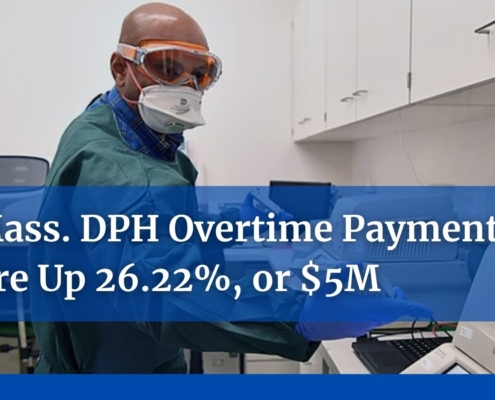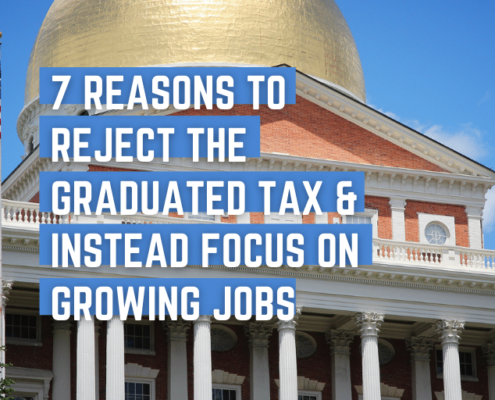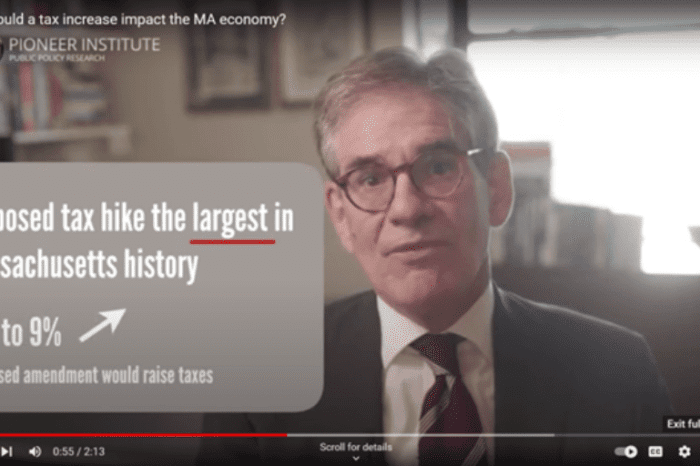How would a tax increase impact the MA economy?
/in Blog: Economy, Economic Opportunity, Featured /by Editorial Staff Share on Facebook
Share on Twitter
Share on
LinkedIn
+
Pioneer’s Charlie Chieppo explains how an income tax hike in Massachusetts will impact retirees and small business owners – not just the “super rich.”
Get Updates on Our Economic Opportunity Research
Additional Pioneer reports on the Mass. economy:
Related Posts

Employment trends in the Greater Boston Area and Touristy Massachusetts Counties during the COVID-19 Pandemic
Using MassEconomix, Pioneer Institute’s database on employment…

Ely Kaplansky Goes from Immigrant to Inc. 5000 Insurance Entrepreneur
This week on JobMakers, host Denzil Mohammed talks with Ely Kaplansky, President & CEO of Kaplansky Insurance. Since 1974, Ely has created hundreds of jobs in Massachusetts and beyond, with 85 employees in 15 offices across the state today, and he has grown his business during the pandemic, such that Kaplansky Insurance was named to Inc. magazine’s "5000 Fastest-Growing Private Companies in America" list. His success fulfilled the dreams of his parents when they moved from Israel to America in 1955, with just the clothes on their backs and an aunt to take them in. Their journey began in the concentration camps of Germany, and Ely’s story is all about the opportunity and freedom America offers.

Umesh Bhuju Seeks a Fair Deal for Immigrants, Farmers & the Environment
This week on JobMakers, Host Denzil Mohammed talks with Umesh Bhuju, owner of Zumi’s Espresso in Ipswich, Massachusetts, about how a business model based on selling nothing but fair-trade products can thrive in a world driven by profit. He describes his early experiences in his homeland of Nepal, where he witnessed child labor, and how that has shaped his pursuit of the American dream.

Study Says Massachusetts Surtax Proposal Could Reduce Taxable Income in the State by Over $2 Billion
As voters now begin to weigh the potential impact of a ballot proposal to increase taxes on business owners, retirees and wealthier households, a new literature review by Pioneer Institute shows that many existing academic studies find that wealthy individuals are particularly sensitive to changes in tax policy. Other studies explicitly warn policymakers that behavioral responses to taxing the rich could erode the tax base and ultimately strain state budgets.

COVID-19 and Unemployment Rates in the Cape and Islands
The COVID-19 pandemic has had a large impact on unemployment…

This Is No Time for a Tax Increase
This is no time to threaten Massachusetts’ prospects for an immediate economic recovery and the long-term competitiveness of the Commonwealth’s businesses. As Massachusetts lawmakers prepare to vote on whether to send a proposed constitutional amendment that would impose a 4 percent surtax on residents who earn $1 million or more in a year to the statewide ballot in 2022, Pioneer Institute urges them to recognize that tax policy sizably impacts business and job location decisions and that jobs are more mobile than ever.

Putting in the Extra Hours: The Spike in Mass. Department of Public Health Overtime Pay during COVID-19
During the heat of the COVID-19 pandemic, Massachusetts Department of Public Health (DPH) payroll data presented a 29.09% increase in the average employee’s overtime pay from the previous year. Pioneer wanted to dig deeper into the Department’s compensation trends to put the $5M bump in 2020 DPH overtime pay into perspective.

Jitka Borowick on Starting a Small Business during COVID
This week on JobMakers, Guest Host Jo Napolitano talks with Jitka Borowick, Founder & CEO of Cleangreen, a cleaning service committed to environmentally-friendly practices, and Nove Yoga, launched during COVID. Jitka grew up under communism in the Czech Republic. Determined to learn English, she made her way to the U.S., initially with plans to stay for only one year - but ended up making it her home. Jitka shares the difficulties of learning another language and culture, her pathway to entrepreneurship, her courageous decision to open a new business during a pandemic, and how her companies have successfully adapted to the challenges so many small businesses have encountered over the past year.

Study Finds Deep Flaws in Advocates’ Claims that the Massachusetts Tax Code is Regressive
Proponents of a state constitutional amendment to add a 4 percent surtax on all households with annual income above $1 million frequently cite 2015 data from the Institute on Taxation and Economic Policy, which argues that the Massachusetts tax code is regressive, but a new study published by Pioneer Institute debunks many of the underlying assumptions used in ITEP’s 2015 report.

Mahmud Jafri Builds on a Pakistani Legacy in America
This week on JobMakers, Host Denzil Mohammed talks with Mahmud Jafri, who built on a legacy started by his grandfather and began importing hand-knitted rugs from his native Pakistan, creating opportunities especially for women who traditionally couldn’t work outside the home. Today, he has three Dover Rug & Home stores across Massachusetts, including the Back Bay.

Study Says Interstate Tax Competition, Relocation Subsidies Exacerbate Telecommuting Trends
A spate of new incentive and subsidy programs seeking to lure talented workers and innovative businesses away from their home states could constitute an additional challenge to Massachusetts’ economic and fiscal recovery from COVID-19, according to a new study published by Pioneer Institute.

7 Reasons to Reject the Graduated Tax and Instead Focus on Growing Jobs
Pioneer Institute's Statement before the Joint Committee on Revenue In Opposition to: HB 86 (Pages 1-4), a legislative amendment to the Constitution to provide resources for education and transportation through an additional tax on incomes in excess of one million dollars.



